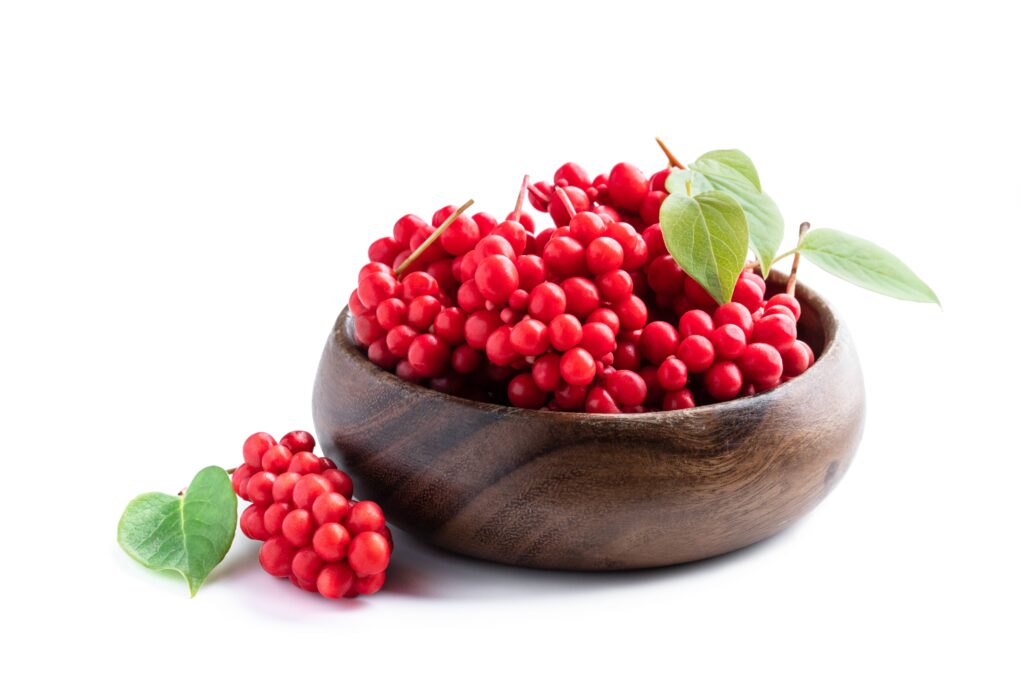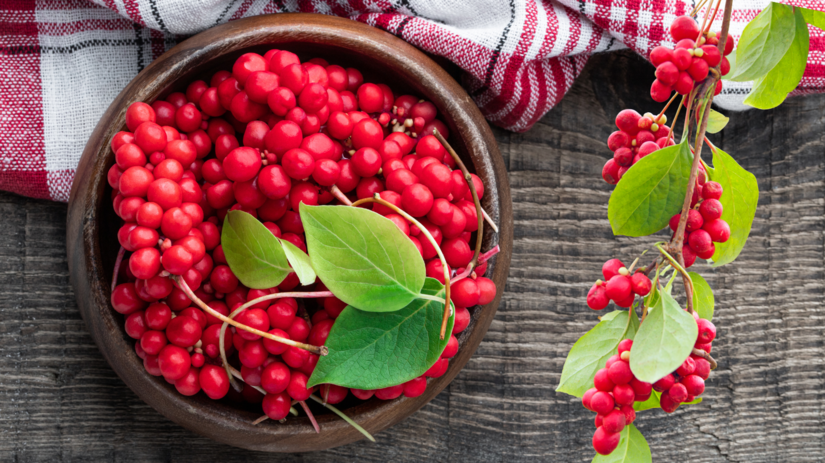Schizandra (Schisandra chinensis), also called “Wu Wei Zi” in Traditional Chinese Medicine (TCM), is a small red berry with a remarkable reputation. Its name means “five-flavor fruit” because it contains all five basic tastes—sweet, sour, salty, bitter, and pungent—making it unique in both flavor and therapeutic profile.
For centuries, Schizandra has been prized in Chinese, Korean, and Russian herbal traditions as a tonic herb for vitality, endurance, and longevity. Today, it’s considered an adaptogen—a plant that helps the body adapt to stress and restore balance.
Nutritional and Phytochemical Profile
Schizandra berries are rich in:
- Lignans (schisandrin, schizandrol, gomisin) – powerful bioactive compounds.
- Antioxidants – protect cells from oxidative damage.
- Essential oils and organic acids – contribute to flavor and health effects.
- Vitamins and minerals – including vitamin C, E, and trace minerals.
Health Benefits of Schizandra
1. Adaptogenic Power
Schizandra is renowned for its ability to increase resilience to stress, whether physical, emotional, or environmental. It helps the body restore balance without overstimulation.
2. Liver Protection & Detoxification
Lignans in Schizandra support liver regeneration, detoxification, and protection from toxins, alcohol, and heavy metals.
3. Improved Energy & Endurance
Athletes and workers in demanding environments have long used Schizandra to boost stamina, mental clarity, and physical endurance.
4. Cognitive and Mood Support
It may enhance memory, focus, and concentration while also reducing anxiety and mild depression.
5. Skin Health and Anti-Aging
Rich antioxidants make Schizandra a beauty ally, promoting radiant skin, elasticity, and protection from free-radical damage.
6. Immune Balance
It supports immune function, helping to regulate both overactive and underactive immune responses.
Properties of Schizandra
- Adaptogen – restores balance under stress.
- Hepatoprotective – protects and regenerates the liver.
- Antioxidant – combats oxidative stress.
- Anti-inflammatory – reduces chronic inflammation.
- Nootropic – supports mental clarity and memory.
- Tonic herb – promotes overall vitality and longevity.
Uses of Schizandra
🔹 Traditional Uses
- As a longevity tonic in TCM.
- To improve endurance among Chinese emperors and Russian athletes.
- As a liver protective remedy in herbal medicine.
🔹 Modern Applications
- Tea or decoction: dried berries simmered in water.
- Powder: mixed into smoothies, yogurt, or herbal blends.
- Extracts & tinctures: concentrated forms for therapeutic use.
- Supplements: capsules or tablets standardized for lignan content.
⚠️ Precautions and Contraindications
While Schizandra is generally safe when used moderately, there are a few cautions:
- Pregnancy and breastfeeding: not enough evidence to confirm safety.
- Epilepsy or neurological disorders: may stimulate the nervous system in sensitive individuals.
- Gastrointestinal issues: high doses may cause stomach upset.
- Medication interactions: may affect drugs metabolized by the liver (consult your healthcare provider).

Schizandra is a true gem of herbal medicine—an adaptogen that helps the body cope with stress, boosts energy, sharpens the mind, and protects the liver. From ancient emperors to modern wellness seekers, this five-flavor berry continues to prove its worth as a tonic for vitality and longevity.
If you’re curious about Schizandra, start small—try a tea or capsule—and pay attention to how your body responds.
Always consult with a healthcare professional before using it as a supplement, especially if you take medications or have chronic conditions.

